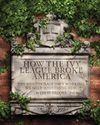
Among the pedestaled titans of Western music, George Frideric Handel was the first composer whose work not only quickly became celebrated in his own time but has been heralded ever since. Before Handel, no real "repertoire" of enduring music had existed. Composers were considered craftsmen in an evanescent art, their creations regularly superseded by fresher work. Most music that got performed was relatively new. Claudio Monteverdi, the preeminent European composer of the early 17th century, was largely forgotten within decades of his death, in 1643. Johann Sebastian Bach amounted to hardly more than a cult figure after he died, in 1750, his major works unplayed well into the next century.
When Handel died, at 74 in 1759, he was already well fortified for posterity. A celebrity since his 20s, he had been the subject of grand portraits and was depicted as Orpheus in a 1738 statue in London's Vauxhall Gardens. Whereas Bach earned an unmarked grave in Leipzig and one obituary four years after he died, Handel was buried in Westminster Abbey.
Handel stands apart in another way from the musical giants who have since been rediscovered and enshrined: Each of them is renowned for an array of oftenperformed pieces. His stature is owed above all to a single work-the oratorio Messiah.
Among the towering masterpieces of Western music, the Messiah occupies a distinctive place: It is familiar to more people than any other work of its kind. Bach's B Minor Mass and St. Matthew Passion and Monteverdi's Vespers are comparable among supreme choral pieces, but they aren't performed at your church or the high school down the street. The Messiah often is, trotted out during the Christmas season by amateur and professional choruses around the globe. A fair percentage of the world probably knows the "Hallelujah" chorus well enough to sing along.
Diese Geschichte stammt aus der December 2024-Ausgabe von The Atlantic.
Starten Sie Ihre 7-tägige kostenlose Testversion von Magzter GOLD, um auf Tausende kuratierte Premium-Storys sowie über 8.000 Zeitschriften und Zeitungen zuzugreifen.
Bereits Abonnent ? Anmelden
Diese Geschichte stammt aus der December 2024-Ausgabe von The Atlantic.
Starten Sie Ihre 7-tägige kostenlose Testversion von Magzter GOLD, um auf Tausende kuratierte Premium-Storys sowie über 8.000 Zeitschriften und Zeitungen zuzugreifen.
Bereits Abonnent? Anmelden

JOE ROGAN IS THE MAINSTREAM MEDIA NOW
What happens when the outsiders seize the microphone?

MARAUDING NATION
In Trumps second term, the U.S. could become a global bully.

THE GENDER WAR IS HERE
What women learned in 2024

The Weirdest Hit in History
How Handel's Messiah became Western music's first classic

ONE FOR THE ROAD
What I ate growing up with the Grateful Dead

HOW THE IVY LEAGUE BROKE AMERICA
THE MERITOCRACY ISN'T WORKING. WE NEED SOMETHING NEW.

Against Type
How Jimmy O Yang became a main character

Catching the Carjackers - On the road with an elite police unit as it combats a crime wave
On August 7, 2022, Shantise Summers arrived home from a night out with friends around 2:40 a.m. As she walked from her car toward her apartment in Oxon Hill, a Maryland neighborhood just southeast of Washington, D.C., she heard footsteps behind her. She turned and saw two men in ski masks. One put a gun to her face; she could feel the metal pressing against her chin. He demanded her phone, wallet, keys, and Apple Watch. She quickly handed them over, and they drove off in her 2019 Honda Accord.

The Most Remote Place in the World - Point Nemo is Earth's official "middle of nowhere." A lot seems to be going on there.
It’s called the “longest-swim problem”: If you had to drop someone at the place in the ocean farthest from any speck of land—the remotest spot on Earth—where would that place be? The answer, proposed only a few decades ago, is a location in the South Pacific with the coordinates 48 52.5291ᤩS 123 23.5116ᤩW: the “oceanic point of inaccessibility,” to use the formal name. It doesn’t get many visitors. But one morning last year, I met several people who had just come from there.

The Elite College Students Who Can't Read Books - To read a book in college, it helps to have read a book in high school.
Nicholas Dames has taught Literature Humanities, Columbia University's required greatbooks course, since 1988. He loves the job, but it has changed. Over the past decade, students have become overwhelmed by the reading, College kids have never read everything they're assigned, of course, but this feels different. Dames's students now seem bewildered by the thought of finishing multiple books a semester. His colleagues have noticed the same problem.